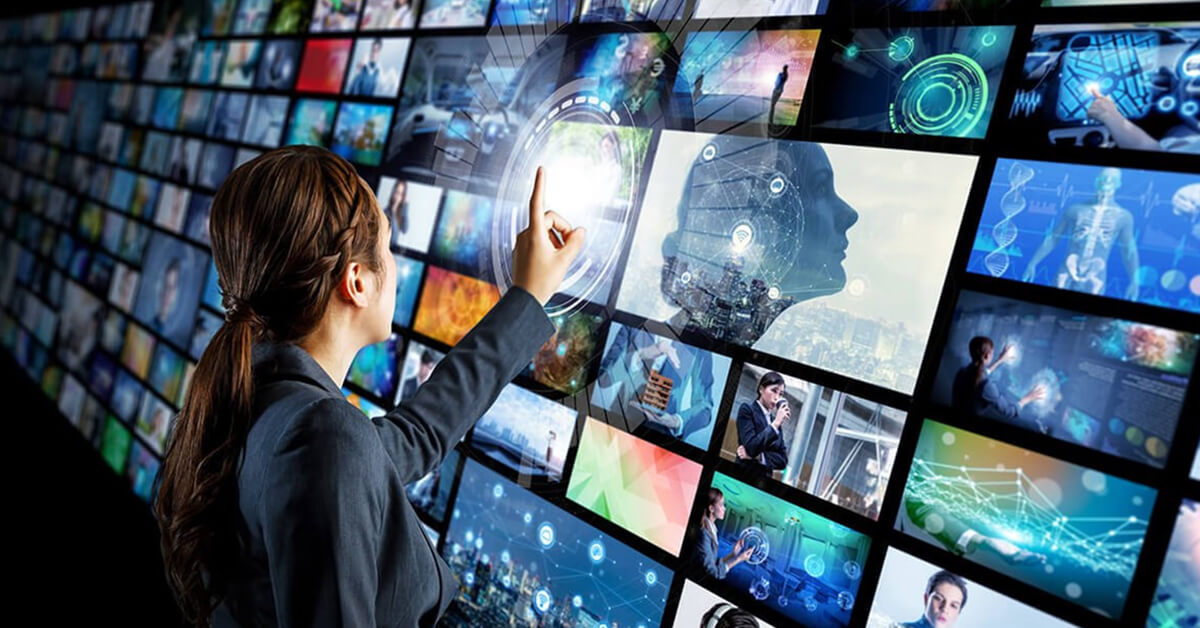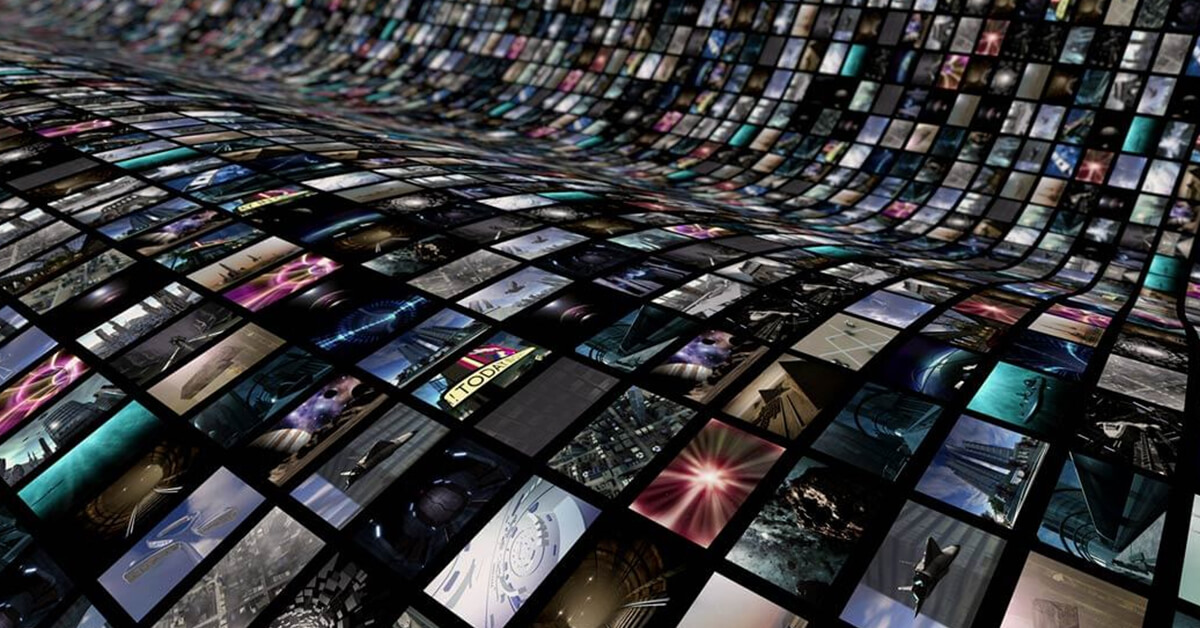
When it comes to technology, the entertainment sector has always been on the cutting edge, continuously pushing the envelope. The industry is about to undergo a significant change, especially because of the rapid growth of artificial intelligence (AI), particularly in the film sector. The use of artificial intelligence (AI) technology to create films from beginning to end is one of the most intriguing advancements.
We are on the verge of digital transformation and live in an era of the Fourth Industrial Revolution (a way of blurring the boundaries between the digital, physical, and biological worlds). With the fusion of technological advances in AI, ML (machine learning), robotics, Web3, the Internet of Things (IoT), 3D printing, blockchain, quantum computing, genetic engineering, and more, the Fourth Industrial Revolution and digital transition have become a reality. AI and ML technologies soon started having a powerful grip on the media and entertainment industry.
How AI is Revolutionizing the entertainment business
Artificial intelligence plays a significant role in boosting marketing efficiency, personalization, and workflow automation in the media and entertainment space. Media houses leverage the power of artificial intelligence and machine learning to streamline their advertising activities in diverse arenas to increase workflow efficiency and revenue and reduce operational costs.
The role of AI in the entertainment business is manifold, and its influence is felt in multiple spaces, including -
- Film Production: AI has been gifting the film industry several famous sci-fi movies, including Marvel's Avengers: Age of Ultron, the Terminator, Wall-E, and more.
- Music Production: AI-based technology boosts music production through AI compilers for generating original compositions and intelligent vocal synthesis that helps apply voice recognition techniques.
- Game Development: AI in gaming helps deliver adaptive, interactive, and responsive video game experiences via non-player characters (NPCs).
- Subtitle Generation: Using natural language processing (NLP) and machine learning algorithms, devices can generate video subtitles automatically.
Media houses leverage the power of AI and ML to streamline their activities on diverse fronts, including the following -
- Automated Content Generation: AI has transformed the way media companies create and deliver content to engage with their audience. AI techniques can generate written content, audio, and visuals or graphics automatically and intelligently.
- Personalized User Experience: Using machine learning algorithms and deep learning networks, media houses can study each user’s demographics, behavior, and performance. It helps them generate personalized content and ultra-targeted messages or recommendations to boost conversions.
- Predictive Analysis: AI can optimize your marketing efforts since AI-powered predictive analysis can help analyze previous entertainment industry data, thus providing valuable insights into future media content demands and trends. Hence, film industry marketers can devise high-quality, targeted online content to engage their audience and craft more impactful campaigns.
- Detecting Copyright Infringement: Copyright violations are a big problem in the film or music industry, and the explosion of social media added fuel to the fire. AI comes to the rescue by detecting and preventing any possible copyright infringement. Furthermore, AI has the potential to fight the dissemination of fake and unverified news.
The ways AI is changing the entertainment industry

Now that we know the power of artificial intelligence in the entertainment industry, we will discuss how it is transforming this sector by driving innovations and delivering premium audience engagement.
1. Personalizing Content
It is quite stressful for viewers to find the perfect 2-hour watch from millions of films and songs. Therefore, AI can help in shortlisting the best movies. Rather than spending hours shortlisting and researching the best binge watches and film recommendations manually, you can use AI-powered software to offer Hyper-personalisation.
These AI tools can collect, prioritize, and curate content and recommendations based on the viewer’s precious watch histories and genre preferences. After gathering this entertainment industry data, the software will create specific datasets for the user, and from here, the platform’s algorithm can get the best match for movies and songs according to the viewer’s liking. Some popular examples of content personalization include aligning the customer’s interest with the following -
- Genre or category
- Favorite actors/directors
- Movie length
- Regional language
- Latest releases
- Topic, etc.
We have already seen how Netflix, Amazon Prime Video, Spotify, etc., do this regularly. We receive customized movie preferences and song suggestions, which help media and entertainment companies enhance customer retention. Moreover, as the world has started adopting OTT streaming platforms, the audience is willing to pay premium prices to receive personalized content and recommendations, making this model a success.
2. VR and AR
Virtual Reality and Augmented Reality are meaningless without artificial intelligence. VR and AR offer immersive experiences to users, taking entertainment and gaming to the next level. This immersive technology enables the audience to reach new environments by going beyond the 2-dimensional spaces.
Augmented Reality is mainly beneficial in sports events. However, its applications are also extended to presentations and museums, providing real-time information to viewers about the surrounding circumstances and objects.
On the other hand, Virtual Reality enables users to enter a completely different universe or their chosen reality. It is more popular with Meta, and more research and implementation are ongoing among media companies like Facebook, who are investing valuable resources into it already.
3. Advertising and SEO
Artificial intelligence can boost search engine optimizations (SEO) as AI tools and databases have access to huge chunks of data sets. Since customers’ preferences and market demands are constantly changing, media companies need an automated and personalized approach toward advertising and SEO strategies.
Businesses need to stay updated with real-time market data to offer relevant messages. Therefore, AI in advertising helps companies craft targeted ad campaigns. Using deep learning techniques, AI tools can help media houses focus on the users’ specific preferences rather than basing their marketing decisions on assumptions.
4. Quality Streaming
The entertainment industry is continuously working toward improving the viewers’ streaming quality. Providing premium content is necessary to retain viewers in today’s highly competitive market.
Therefore, Netflix and other streaming services use machine learning techniques to upgrade their front-end and back-end operations. It also improves the user interface for high-quality viewing and streaming experiences. Netflix’s top-notch viewing and streaming quality answers why it has such a wide audience base.
5. Fraud Security is Better
Cybersecurity in the entertainment sector is vital, like any other industry. As the industry continues to expand, cyber-attacks and fraudulent activities have also increased. Hackers and attackers are installing multiple malware, leading to a high number of ransomware cases.
AI can automatically detect malware/ransomware and suspicious IP addresses faster. Artificial intelligence can also identify hacking patterns from cyber-attack alerts, which helps detect phishing activities and other dangerous hacking techniques. In the future, AI can help media companies prevent such hacks and cyber-attacks.
The future of AI in the world of entertainment

AI is a game-changer for the media and entertainment industry. Being a highly creative sector, the entertainment space needs to keep up with the trends and deliver more relevant and personalized content. Here is what lies ahead for the motion picture industry.
- Faster project completion: AI helps moviemakers to complete and release their film projects faster, thus saving time and money. Besides, AI can also recreate a deceased actor, thus maintaining continuity in your film projects.
- Innovative experience: Using AR and VR, media houses can deliver interactive and real-life experiences to users.
- Higher experiences for sports enthusiasts: AI for sports is a boon for the sporting industry, as some innovative apps can permit fans to interact among themselves, and listen to a referee's replay or the coach’s/umpire's call. What’s more, the viewers can also order their favorite snacks from the snacks bar while sitting in their stadium seats!
- Interactive digital keyboards for musicians: Modern-day musical apps can help music composers play tunes and record music using virtual keyboards or other musical instruments.
- Screenless screens: As seen in many Hollywood movies, people access a transparent screen floating in the air. Those are virtual layers imposed into reality, and we all will have such screenless screens in the upcoming years!
Conclusion
To conclude, AI technology has become a part and parcel of our daily lives, so much so that we hardly realize its vast potential. Today, diverse industries, like healthcare, education, eCommerce, recruitment, quality assurance, cybersecurity, etc., are reaping the advantages of artificial intelligence and other technologies. More such innovations and technologies are in store for the media and entertainment industry in the future.







